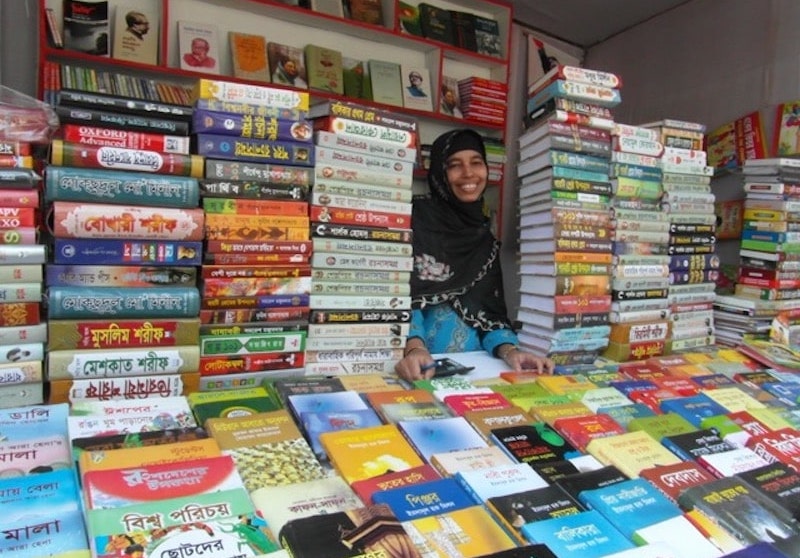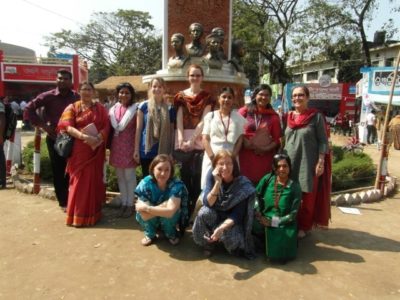
Paola lived in Bangladesh for several years, and all through her time there, she wrote many interesting articles for Expatclic. Today she lives in Bruxelles, but Bangladesh is still in her heart. She sent us this beautiful story on her efforts to learn Bangla when she was living in Dhaka.
In every one of our postings I made an effort to learn at least a few words of the local language, to be able to connect with people. In Bangladesh — the name means ‘country of the Bangla language’ — it was more important to me than anywhere, because the language was so tightly bound to the culture and history.
On 21 February 1952, the people of what was then East Pakistan took to the streets demanding that Bangla be recognised as the official language, to replace Urdu which had been imposed by the government, based in West Pakistan. Police opened fire and four student protesters were killed. This discontent eventually led to the emergence of Bangladesh with independence in 1972 after a nine-month long bloody war.
A makeshift monument, the Shaheed Minar — Tower of the Martyrs — was erected at the site of the killings. Since then, what is known locally as Martyrs’ Day has been observed on 21 February. It has become one of the most important public holidays in Bangladesh. Every year, thousands of people flock to Shaheed Minars throughout the country to pay tribute to the martyrs who sacrificed their lives for their mother tongue. In 1999, UNESCO declared that International Mother Language Day should be celebrated worldwide to promote awareness of linguistic and cultural diversity and multilingualism.
And I tried to do my bit. When we first arrived, I quickly picked up odd words — really odd words. But after months I still couldn’t say ‘How much?’ or ‘May I have a cup of tea?’
So I went along to a local language school.
‘Do you speak Bangla?’ the principal asked me, in Bangla.
‘Ektu ektu,’ I answered. Just a little.
‘What’s your name? Where do you live?’ she asked. I managed to answer.
‘Can you say anything else?’
I spouted ‘sunflower, goat, garlic, sweet potato, crocodile, cow, tasty, one, two, three, car, coconut milk, very beautiful, Thursday …’
‘Can you read at all?’
‘Only the word “Dhaka”.’ It was on every car numberplate in town. ‘But I’m not interested in learning the script. I’d like to make sentences. Like “The crocodile is eating the garlic”.’
She told me it was a copout not to learn to read, and signed me up for the Beginners’ script class to learn Bangla.
My three classmates were from Korea, Canada, and Germany. For two hours every day we deciphered beautiful whorls and flourishes. And I learnt to say ‘How much?’ and ‘May I have a cup of tea?’ I could even hail a rickshaw. (To do that, you call ‘Hey, empty?’)
One night I had a dream. I was playing Scrabble in Bangla, desperately trying to find a seven-letter word. But I couldn’t figure out where one swirl ended and the next one began…
The next day was Field Trip Day at my Bangla school. Five students and five teachers packed into a minibus and headed to the annual Book Fair. We crowded around the stalls, working out the script in colourful children’s books.
‘Crocodile!’ I read.
There were not many foreigners there, and very soon, a TV crew approached us. As Hannah and Deborah from the advanced class chattered away to the camera, I got some quick coaching from my teacher behind the scenes.
That evening I watched the Bangla news on TV. Three quarters of an hour into the programme, our interviews were on. Hannah and Deborah spoke fluently about how happy they were to be there and what a great initiative the fair was (I think — I understood ‘happy’ and ‘book fair’ and they smiled a lot).
Then the camera turned to me.
‘I dream in Bangla,’ I said, in Bangla.
Paola Fornari Hanna
Bruxelles, Belgium
June 2019





